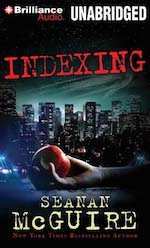
 Indexing
Indexing
By Seanan McGuire; Read by Mary Robinette Kowal
Publisher: Brilliance Audio
Publication Date: 4 March 2014
[UNABRIDGED] – 13 hours
Themes: / metafiction / urban fantasy / fairy tales
I’m usually opposed to quoting the synopsis in my reviews–it’s just fluffing my word count! But I’m not even going to try to explain the premise of Indexing myself, so this time I’ll let the synopsis do all the heavy lifting.
“Never underestimate the power of a good story.”
Good advice…especially when a story can kill you.For most people, the story of their lives is just that: the accumulation of time, encounters, and actions into a cohesive whole. But for an unfortunate few, that day-to-day existence is affected—perhaps infected is a better word—by memetic incursion: where fairy tale narratives become reality, often with disastrous results.
That’s where the ATI Management Bureau steps in, an organization tasked with protecting the world from fairy tales, even while most of their agents are struggling to keep their own fantastic archetypes from taking over their lives. When you’re dealing with storybook narratives in the real world, it doesn’t matter if you’re Snow White, Sleeping Beauty, or the Wicked Queen: no one gets a happily ever after.
Indexing is New York Times bestselling author Seanan McGuire’s new urban fantasy where everything you thought you knew about fairy tales gets turned on its head.
As the author of both the October Day series and, under the pseudonym Mira Grant, the Newsflesh trilogy, Seanan McGuire is no stranger to writing urban fantasy. But, as you may have deduced from the blurb, Indexing is not your run-of-the-mill hot vampire-on-werewolf ménage-a-trois urban fantasy. Instead, it’s populated with fairy tales. Here be Pied Pipers, Frog Princes, and Mother Gooses (Geese?) in spades. In the moribund desertscape of urban fantasy, Indexing is a cool refreshing garden grown wild with novelties. McGuire’s writing is dynamic enough to play fair with both the here-and-now realities of an urban setting and the timeless terrible beauty of fairy tales. Like quicksilver, the tone can glide from spunky 21st-century dialogue riddled with F-bombs to an ethereal transcendence full of snow and moonlight.
The presence of stories come to life in the world of Indexing places it squarely in the realm of metafiction. In fact, the book takes its title from the very real Aarne-Thompson Index, a comprehensive listing of folktale types compiled in the early twentieth century. In the land of metafiction, Indexing has some pretty affluent neighbors, such as Italo Calvino’s If On A Winter’s Night A Traveler and Jorge Luis Borges’s The Library of Babel. Unfortunately in this regard the book fails to measure up, like that rundown house you drive by on your street and mutter about how you wish the neighbors would cut their grass. The premise itself is intriguing in exactly the way that speculative fiction is supposed to be, but the underlying worldview is overly pessimistic. In this story, Narrative itself is a character, or at least a vital force, trying to impose itself onto our order of reality. According to the world of Indexing, this is almost always a very bad thing, something that needs to be stopped. The novel’s closing chapters bring to light some extenuating circumstances that lend this structure a modicum of feasibility, but the reader still comes away with the sense that our world is better off without fairy tales made manifest stalking our streets.
As I write this, it occurs to me that this bothers me so much because it’s at odds with why I read speculative fiction in the first place. I firmly believe that these stories really do make our world better, in a very tangible way. I’m not saying we should unleash every fictional character on the streets of New York–there would probably be utter chaos. But there would be hope too. There would be Aragorn, for example, and Optimus Prime, and–you get the idea. The influx of story into our own world, “mimetic incursions” as they’re called in Indexing, needn’t always be the harbingers of misery and ruin. In fact, I think I took personal offense at the book’s denigration of stories. And then, of course, there’s the added irony that we’re actually reading, or listening to, a story. Just what sorts of mimetic incursions will Indexing spawn, I wonder. Ahh, the joys of peeling the layers of metafiction, kind of like an onion, but pointier and more slippery.
To be clear, my criticism of the novel’s metafiction is purely ideological. Leaving those aside, McGuire tells a damn good story. The pacing ratchets up the suspense like a mystery novel, and the writing, as I said, is sturdy as a house made of bricks. (See what I did there? Three Litle Pigs reference? Okay, never mind, on with the review.) And even if the book’s metafiction elements are problematic, its exploration of storytelling does succeed on a psychological levee. Narrative psychology and therapy have become buzz words in the last twenty years, and on both individual and cultural levels we do think of our lives, both individually and collectively, as stories. In that sense, the main characters of Indexing become archetypes for ways in which people deal with their stories, their past, their trauma, whichever psychobabble catch phrase you like. Some fight it, others embrace it, while still others have more of a story than they think they do. Like most good speculative fiction, Indexing succeeds because of its powerful characterization.
Mary Robinette Kowal, a weaver of fantastic tales in her own right, shines as Indexing‘s narrator. Her performance of Henrietta Marchen, a recovering Snow White through whose eyes we see most of the book’s events, is at once confident and vulnerable in perfect measure. And I don’t think I’ve ever heard a female narrator quite reach the baritone depths that Kowal does when she voices the burly Andy Robinson. The only blemish in the performance is her portrayal of Sloan Winters, whose incurably foul mouth is already grating enough without eery sentence curling up at the end like a skunk’s tale. Perhaps Kowal is simply trying to instill in us, the listeners, the same distaste that Sloan’s teammates feel towards this Wicked Sister. But that’s the only cloud in the sky. The glamour of Kowal’s voice captures the capricious fairy-tale heart of Indexing.
In spite of my significant ideological qualms with the book, I thoroughly enjoyed McGuire’s foray into the world of fairy tales. There’s no indication that a sequel is in the works, which is a shame. I’d gladly spend more time with this world’s colorful characters and fairy tales, morose and morbid though they may be. And I would dearly love to learn that Narrative isn’t so bad after all.
Posted by Seth Wilson

 Brad Lansky and the Alien at Planet X
Brad Lansky and the Alien at Planet X
 Little Fuzzy
Little Fuzzy To Honor You Call Us (Man of War #1)
To Honor You Call Us (Man of War #1) Flesh and Blood
Flesh and Blood